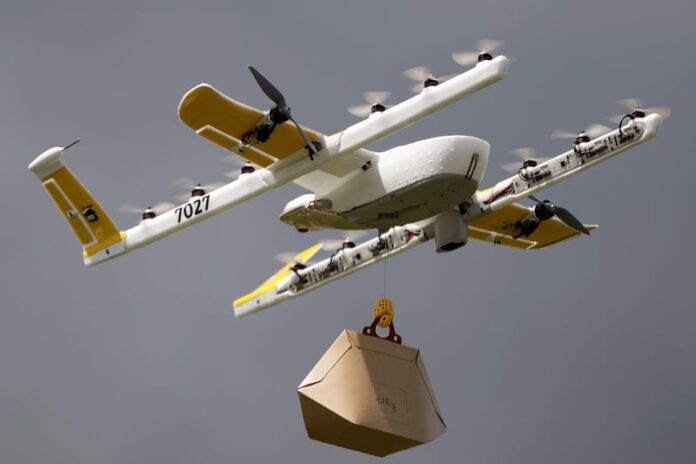
Drone-delivery company Wing offered a preview of the future of package delivery on August 7th, ferrying popsicles and ice cream to two homes in Montgomery County as part of a technology demonstration under the federal UAS Integration Pilot Program.
Wing, a subsidiary of Google parent company Alphabet, conducted the demo in partnership with the Virginia Tech Mid-Atlantic Partnership for an audience of officials from the Federal Aviation Administration and federal, state, and county government. Wing has been working with Virginia Tech since 2016, when they delivered more than 1000 Chipotle lunches.
Tuesday’s flights, just a few miles from Virginia Tech’s main Blacksburg campus, were their most advanced tests to date in the United States, demonstrating not only a package delivery system that promises to make transportation of goods faster, safer, and more efficient, but also critical technology like drone remote identification.
“Drone technology is going to change our everyday experience, and one of the first ways the public might experience that shift is package delivery. Here, we got a preview of what that future might look like — being able to order ice cream or a bottle of water from your backyard, and it arrives a few minutes later. It’s all done in a way that’s been extensively tested to be safe and efficient. And the ice cream is still cold,” said MAAP Director Mark Blanks.
Through the program, the Virginia team will seek expedited flight permissions from the Federal Aviation Administration to perform some of the most complex flight testing ever attempted in the U.S. The day-to-day operations of the program in Virginia are managed by the Virginia Tech Mid-Atlantic Aviation Partnership (MAAP), which has accumulated significant expertise running one of only seven federal test sites for unmanned aircraft systems. The organization has built a reputation for facilitating groundbreaking testing while upholding the most rigorous standards of safety.
Over the next three years, the team will explore applications of drone technology that stand to offer Virginians significant benefits, including package delivery, emergency management, and infrastructure inspection.
The pilot will also focus on gathering feedback from the communities where testing takes place about their experiences with the program, so that technology and regulations can continue to serve the needs of the public as they evolve.
Virginia’s successful bid was led by the state’s Innovation and Entrepreneurship Investment Authority and the Center for Innovative Technology. The Virginia Autonomous Systems Center of Excellence, the Virginia Department of Aviation, the Virginia Commercial Spaceflight Authority, the Virginia Department of State Police, the Virginia Department of Transportation, the Virginia Department of Emergency Management, and Virginia Tech round out the list of state organizations involved.
The state’s proposal was bolstered by support from a bipartisan coalition, including Sen. Warner and Reps. Bob Goodlatte, Morgan Griffith, and Barbara Comstock.
Corporate partners joining Virginia include Project Wing, Intel, AT&T, Airbus Aerial, State Farm, Dominion Energy, Sinclair Broadcast Group, and HAZON Solutions.
Project Wing is a part of Alphabet’s moonshot factory, X. The group worked with MAAP in 2016 for their first autonomous drone delivery test with members of the public in the U.S. and returned in June 2017 to take part in testing convened by NASA and the FAA to test unmanned air traffic management systems. MAAP has also worked with Dominion and HAZON on a number of infrastructure-inspection projects and with Sinclair Broadcast Group on a unique aerial-journalism training program.

